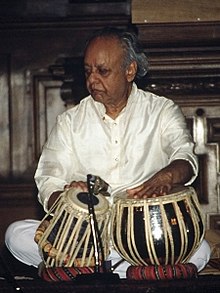Ustad Alla Rakha
| Alla Rakha Qureshi | |
|---|---|

Alla Rakha in 1988 (he was right handed unlike shown here)
|
|
| Background information | |
| Birth name | Alla Rakha Qureshi |
| Born |
29 April 1919 Ghagwal, Jammu and Kashmir, British India |
| Origin | Dogra (Indian) |
| Died | 3 February 2000 (aged 80) Mumbai, Maharashtra, India |
| Genres | Hindustani classical music |
| Instruments | Tabla |
| Associated acts | Ravi Shankar, Zakir Hussain, Aditya Kalyanpur |
Ustad Allarakha Qureshi (29 April 1919 – 3 February 2000), popularly known as Alla Rakha, was an Indian tabla player specialized in Hindustani Classical music. He was a frequent accompanist of sitar player Ravi Shankar.
Allah Rakha was born in Ghagwal, Jammu and Kashmir, British India. His mother tongue was Dogri. He became fascinated with the sound and rhythm of the tabla at the age of 12, while staying with his uncle in Gurdaspur. Finding little chances for grooming and appreciation, the determined young lad ran away from home, became a disciple of tabla began studying it with Mian Kader Baksh of the Punjab gharana of tabla players. Sabir Rakha, a brother, also played the tabla.
He studied voice and Raag Vidya under Ashiq Ali Khan of the Patiala gharana. His regimen of practice and dedication were legendary: hours upon hours of hard, disciplined practice, that would later pay off.
He was married to Bavi Begum and their marriage produced three sons, Zakir Hussain, Fazal Qureshi and Taufiq Qureshi; two daughters, Khurshid Aulia née Qureshi and Razia; and nine grandchildren. They all survived him except Razia; it was the news of her death the day before that is thought to have caused his fatal heart attack.
Allah Rakha began his career as an accompanist in Lahore and then as an All India Radio staffer in Bombay in 1940, playing the station's first ever tabla solo and elevating the instrument's position in the process. Soon after, he composed music for a couple of Hindi films from 1943–48.
However, he still played as an accompanist, for soloists like Bade Ghulam Ali Khan, Allauddin Khan, Vilayat Khan, Vasant Rai, Ali Akbar Khan, and Ravi Shankar. The venerable master achieved world renown as Shankar's chief accompanist during his apex in the 1960s, delighting audiences in the West with his percussive wizardary, not only as an uncanny accompanist with flawless timing and sensitivity but also as a soloist where he was a master of improvisation, a prolific composer and an electric showman. The partnership was particularly successful, and his legendary and spellbinding performances with Shankar at the Monterey Pop Festival in 1967 and the in 1969 served to introduce classical Indian music to general Western audiences.
...
Wikipedia
